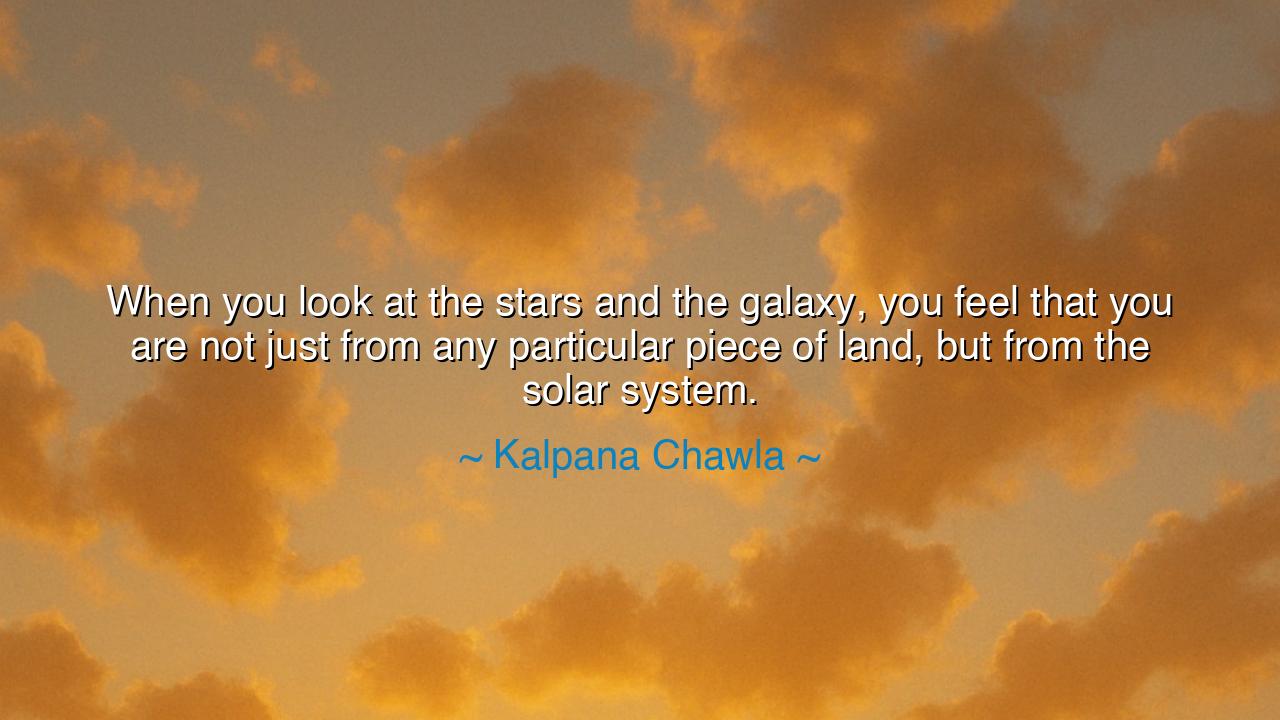
When you look at the stars and the galaxy, you feel that you are
When you look at the stars and the galaxy, you feel that you are not just from any particular piece of land, but from the solar system.






In the vastness of the cosmos, where stars stretch across the heavens like the brushstrokes of a divine painter, there comes a moment when the soul of a traveler, gazing upward, realizes the profound truth of existence—that they are not bound by the earthly borders and divisions of nations. Kalpana Chawla, a brave spirit who ventured beyond the confines of our world, once said, "When you look at the stars and the galaxy, you feel that you are not just from any particular piece of land, but from the solar system." Her words speak to a deeper understanding, one that transcends the artificial boundaries we place upon ourselves and connects us to the infinite expanse of the universe. In her gaze upon the stars, she found a sense of unity and belonging not just to Earth, but to the greater cosmos.
To stand beneath the night sky, to see the stars scattered like diamonds upon a vast, endless canvas, is to feel the pull of something greater than oneself. For much of human history, nations have defined our sense of identity—our borders, our flags, and our ancestors. We have fought over land, over territories, believing that our heritage is tied to the soil beneath our feet. Yet Chawla’s words remind us that this view is narrow. When we look upward to the stars, we are reminded that we are not merely children of a single land or nation, but children of the solar system, and by extension, the universe itself. The stars, planets, and galaxies are our true home, and in their vastness, we are united—not by the lines on a map, but by the shared journey of existence.
Consider, O children of the future, the ancient philosophers and sages who, with their eyes cast to the heavens, sought to understand the nature of the cosmos. Plato and Aristotle believed that the heavens were a reflection of the divine order—that the universe was a place of harmony, where everything had a place and a purpose. But as time passed and humanity’s understanding grew, we began to see the universe not as a distant, unattainable realm, but as a vast network to which we belong. Chawla’s insight is an extension of this ancient wisdom: we are not merely inhabitants of a single land, but travelers in a greater cosmic journey. The stars above are not distant strangers, but the very fabric of our being.
In the context of space exploration, Chawla’s words take on even greater significance. She was not just a visionary, but a pioneer in the truest sense. She ventured beyond the confines of Earth, defying all the limitations placed upon her by society, gender, and geography. Her journey into space was not just an achievement for herself, but for all humanity. It was a reminder that the human spirit is boundless and that our potential is not confined to the earthly realm, but stretches to the stars. Like Christopher Columbus, who set sail into the unknown, driven by the belief that new lands awaited, Chawla sailed into the heavens, driven by the knowledge that the universe itself was there for the exploring.
But Chawla’s reflection is not merely about the exploration of space. It is a call to expansion, a reminder that the borders of our world are merely constructs, limitations of the mind. When we look to the stars, we are reminded of the vastness of our shared existence. We are not separate from one another, bound by the land we occupy, but connected through the very fabric of the cosmos. In a world that often emphasizes difference—whether by nation, culture, or creed—Chawla calls us to remember that we are part of something far larger, something that binds us all together as one people, under the stars of the same sky.
In the modern age, as we look to the future, her words are even more important. The challenges we face—climate change, global conflict, inequality—are the result of our inability to see beyond our own small, divided spaces. If we are to overcome these challenges, we must look to the stars as Chawla did and recognize our place within the cosmic order. We must move beyond the limitations of nationality and division and see ourselves as part of the solar system, as part of something far larger than the conflicts and struggles that separate us. Only by embracing this shared identity can we hope to build a future where all of humanity thrives, united under the vast sky.
O children of the future, let this wisdom guide your journey: when you look to the stars, remember that you are not just of the Earth, but of the cosmos itself. Let the universe be your guide, your companion, and your reminder that all of humanity is connected, that our destiny is shared. Let the stars be not distant objects to admire, but beacons that call you to greater understanding, unity, and exploration. In your actions, let the knowledge of the heavens drive you toward compassion and cooperation, for when we look upward together, we see not borders, but the vast, unified expanse of the universe we are all a part of. Let this awareness shape your future, and in it, may you find the strength to create a world where we are united, not by land, but by the stars.






AAdministratorAdministrator
Welcome, honored guests. Please leave a comment, we will respond soon